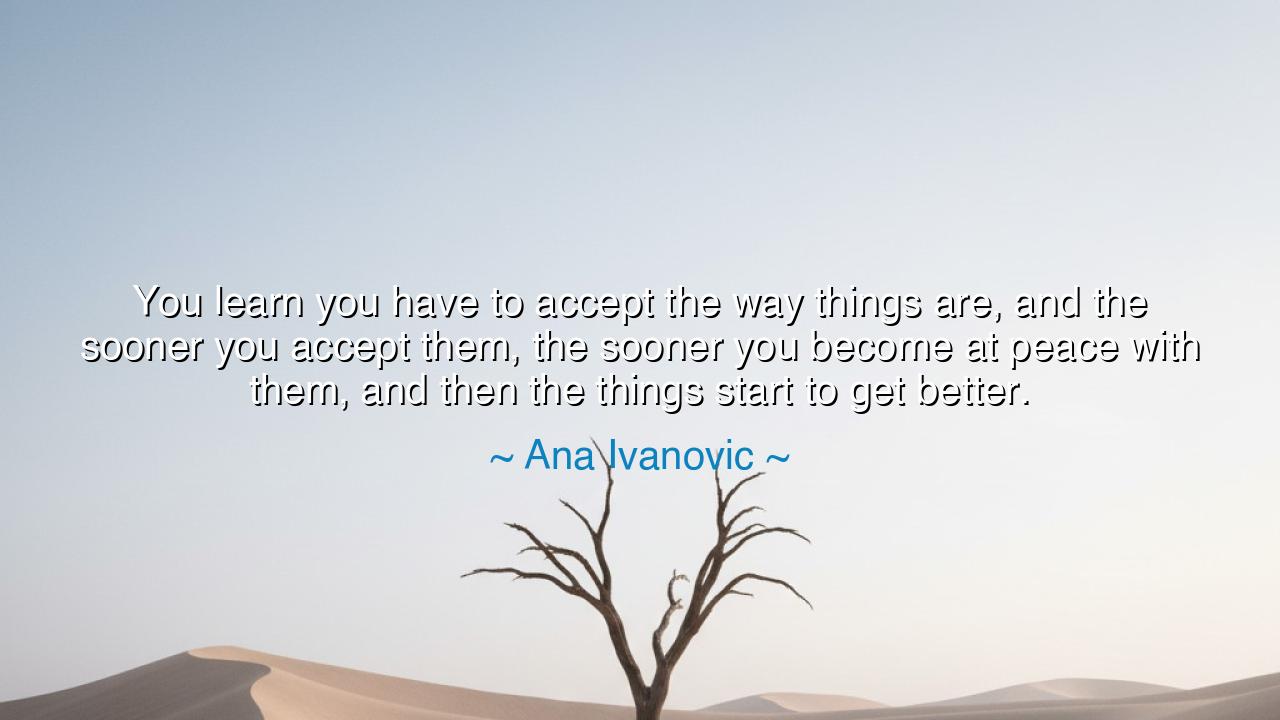
You learn you have to accept the way things are, and the sooner
You learn you have to accept the way things are, and the sooner you accept them, the sooner you become at peace with them, and then the things start to get better.






Hear the words of the athlete and seeker, Ana Ivanovic, who declared with quiet wisdom: “You learn you have to accept the way things are, and the sooner you accept them, the sooner you become at peace with them, and then the things start to get better.” These words were not born of comfort but of struggle, forged on the courts of competition and in the trials of life. They speak of a truth older than empires—that the path to healing, strength, and renewal begins with acceptance.
To accept is not to surrender in defeat, nor to yield in despair. It is to see reality as it is, without illusion, and to embrace the moment with clarity. Many souls suffer endlessly not because of what has happened, but because they resist it, refusing to let go of how they wish it had been. In this resistance, their hearts are torn, their spirits restless. But once one accepts the truth of what is, the burden lifts, and the heart begins to breathe again. Only then can there be peace.
Consider the story of Marcus Aurelius, emperor and philosopher of Rome. Surrounded by war, betrayal, and plague, he wrote in his meditations that one must not curse fate, but embrace it as part of the order of the universe. He taught that by accepting reality, even when painful, the soul remains unbroken. Like Ivanovic, he understood that acceptance is the key to inner freedom. To resist what cannot be changed is to exhaust oneself; to accept it is to harness strength for what can yet be shaped.
And it is not only acceptance that Ivanovic points to, but the transformation that follows. She says, “then the things start to get better.” When the mind stops fighting against what has already happened, energy is freed to move forward. Like a sailor who stops cursing the wind and instead adjusts his sails, the one who accepts reality can begin to navigate toward calmer waters. Thus acceptance is not stagnation, but the beginning of renewal and growth.
History gives us further proof. After the devastation of the Second World War, nations lay in ruins. To dwell in despair or cling to lost glories would have meant endless misery. But in Japan, the people accepted the reality of their defeat and devastation, and from that acceptance rose resilience. They rebuilt their cities, their industries, their lives. In a single generation, they transformed ruin into prosperity. Acceptance did not bind them; it freed them to begin again.
O children of tomorrow, remember this: to deny reality is to remain trapped in it, but to accept reality is to move beyond it. When illness comes, when failure wounds, when loss breaks the heart, you may be tempted to resist, to rage, to cling to what was. Yet only when you release resistance and choose acceptance can you find peace, and in that peace, the strength to rise anew.
Therefore, practice this lesson in your own life. When hardship comes, breathe deeply and say, “This is how it is.” Do not confuse this with giving up—rather, see it as the first step of courage. Once you are at peace with reality, lift your head, gather your strength, and act to make things better. For as Ana Ivanovic teaches, the sooner you accept, the sooner life begins to heal, and the sooner hope begins to grow.
Thus her words shine as a lamp for all generations: acceptance is the gateway to peace, and peace is the soil in which better things begin to bloom.






GTGiang Tran
I love the simplicity of this quote, but I also feel there’s more to it. Acceptance does bring peace, but does it always lead to things getting better, as Ivanovic suggests? Sometimes, it feels like accepting something means you’ve let go of hope for change. How do we know when to accept something versus when to keep pushing for something better? It’s interesting to consider how acceptance fits into the broader picture of growth and progress.
TTThanh Tam
Ana Ivanovic’s quote feels like a reminder that peace comes from within, but I wonder, what does acceptance really look like in practice? It seems easy to say you should accept things, but when life throws challenges at you, how do you differentiate between ‘acceptance’ and ‘resignation’? Does accepting a situation mean you stop trying to improve it, or can both coexist, where you accept but still take action for improvement?
DATran Le Duc Anh
I find this quote quite powerful, especially the idea that accepting the situation leads to peace. It reminds me that sometimes we focus too much on what isn’t going right instead of finding peace with what is. But I wonder, does accepting things mean you stop striving for change? How do we strike a balance between acceptance and the motivation to make things better without feeling complacent?
SCShika Chan
Ana Ivanovic’s words really speak to the power of acceptance in life. It's true that sometimes the struggle comes from resisting reality instead of embracing it. But is it always easy to accept the way things are? There are situations where accepting things feels like giving up, not finding peace. How do we reconcile the idea of accepting difficult situations with the drive to improve or change them?